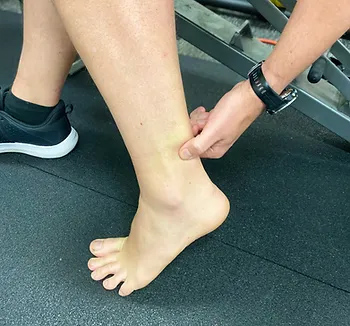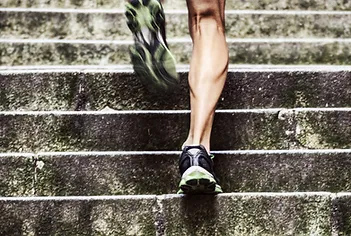Today on the Praxis What We Preach blog, where we shed light on Achilles tendinopathy, a common condition affecting athletes and active individuals. In this article, we will explore the causes, symptoms, and effective treatment strategies for managing Achilles tendinopathy, empowering suffers to return to the things. I draw from personal experience from someone who has had Achilles pain limit my running!
Achilles tendinopathy refers to the degeneration or overload of the Achilles tendon, the band of tissue connecting the calf muscles to the heel bone (calcaneus). This condition primarily affects people engaged in activities involving repetitive jumping, running, or sudden increases in training intensity. Patients with Achilles tendinopathy often experience pain, stiffness, and swelling in the achilles, which can gradually worsen over time. Stiffness and pain is most commonly experienced first thing in the morning, after a long period of sitting or when the achilles has been compressed. Pain can occur in the “mid portion” (pictured below) on in the insertion (as it attaches to the heel bone). This is in an important distinction as these are rehabilitated differently!

Causes and Risks
Achilles tendinopathy typically results from a combination of intrinsic and extrinsic factors. Intrinsic factors include age, reduced flexibility, reduced calf strength / endurance and poor lower limb biomechanics. Extrinsic factors encompass inappropriate footwear, training errors (such as a spike or change in workload), and inadequate warm-up or cool-down routines. Additionally, individuals with systemic conditions like diabetes or rheumatoid arthritis may be more prone to developing Achilles tendinopathy. Understanding these factors is crucial for tailoring treatment plans to address the root causes and minimize the risk of recurrence. But in the most reductionist of terms, Achilles tendinopathy develops due in large part due to a mismatch between loading and the capacity of the tissue.
Diagnosis and Assessment
Accurate diagnosis of Achilles tendinopathy relies on a thorough clinical examination and patient history. Physiotherapists employ various assessment techniques, such as palpation, functional tests, and imaging modalities like ultrasound or MRI, to evaluate the severity and extent of the condition. A self administered questionnaire (VISA-A) can help evaluate symptoms and their effect on physical activity and in turn, the clinical severity. This comprehensive assessment helps determine the appropriate treatment approach, including targeted exercise programs, manual therapy, and other interventions.
Treatment Strategies
Physiotherapy plays a pivotal role in the management of Achilles tendinopathy. Treatment strategies focus on reducing pain, promoting healing, and improving function. These will include calf strengthening exercises, stretching routines and activity modification as frontline options. Moreover, physiotherapists can guide patients in proper footwear selection, gait retraining, and implementing preventive measures to minimize the risk of reinjury.
Rehabilitation and Prevention
Rehabilitation programs are essential for individuals recovering from Achilles tendinopathy. Gradual progression of exercise intensity, functional training, and sport-specific drills enable patients to regain strength, flexibility, and proprioception while minimizing the risk of relapse. Educating patients on proper warm-up and cool-down routines, appropriate footwear selection, and regular monitoring of training loads can significantly contribute to preventing Achilles tendinopathy in the future. One of the common errors patients make is making rehabilitation too easy, or returning to sport too quickly. Again, physiotherapy play a pivotal role in ensuring you undertake a graduated return to loading as the application of mechanical stress to the Achilles tendon promotes tendon healing and remodeling.
Conclusion
Achilles tendinopathy requires a comprehensive approach for effective management. As physiotherapists, our knowledge and expertise are invaluable in helping you overcome this condition and return to their active lifestyles. To discuss your Achilles issues with us to get you back to what you love doing, book online with Praxis today.
Until next time, Praxis What Your Preach.
Team Praxis

